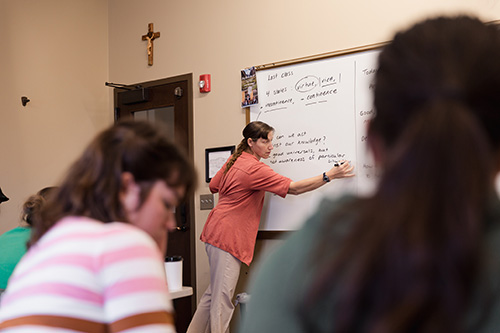Philosophy and the Catholic Faith at Benedictine College
Philosophy, as a discipline, searches for truth and makes arguments based on the light of natural reason. In doing this, we follow the great Catholic tradition asserting the goodness of the human mind and the importance of forming it through philosophical study. We need never fear that reason rightly used will clash with the truths of faith; we trust absolutely in the harmony and cooperation between faith and reason. As John Paul II wrote in Fides et Ratio:
“Faith and reason are like two wings on which the human spirit rises to the contemplation of truth.”
The philosophers at Benedictine have found that our Catholic faith informs what we do in the classroom in many ways:
We do not teach as true anything that contradicts the truths of the faith.
In classes on philosophy of God, for instance, students read and examine carefully the arguments of famous atheists, just as in ethics they might read and examine authors who hold flawed moral theories. We want students to see these arguments clearly and evaluate them based on their own merits. But no Catholic philosopher would present Freud’s argument that God is an illusion, then tell the students that this is true.
theories. We want students to see these arguments clearly and evaluate them based on their own merits. But no Catholic philosopher would present Freud’s argument that God is an illusion, then tell the students that this is true.
We find that our faith acts as a guide in philosophical reasoning
When we are discussing the nature of the human person, for example, a major topic is the meaning of the human body. Christian teaching on the resurrection of the body points us in a certain direction: if the body were merely a cage or a prison, it wouldn’t make any sense for us to get it back after death. While our role is not to analyze this teaching in its fullness, we can point out briefly to students how it guides us toward the truth. All of us use our faith as a guide in this way and encourage our students to do the same.
We emphasize the perennial philosophy that the Catholic Church most values
The members of our department have a shared commitment to philosophical realism and other key conclusions in the tradition of Aristotle and Thomas Aquinas, and we emphasize these views in our classes because we know that there are sound arguments for them. In treating of nature and nature’s God as things that human beings can know through the gift of reason, we apply the words of the Second Vatican Council:
“The philosophical disciplines should be taught in such a way that students acquire in the first place a solid and harmonious knowledge of the human being, of the world and of God, based upon the philosophical heritage which is enduringly valid, yet taking into account currents of modern philosophy.”
~ (Optatum totius)
